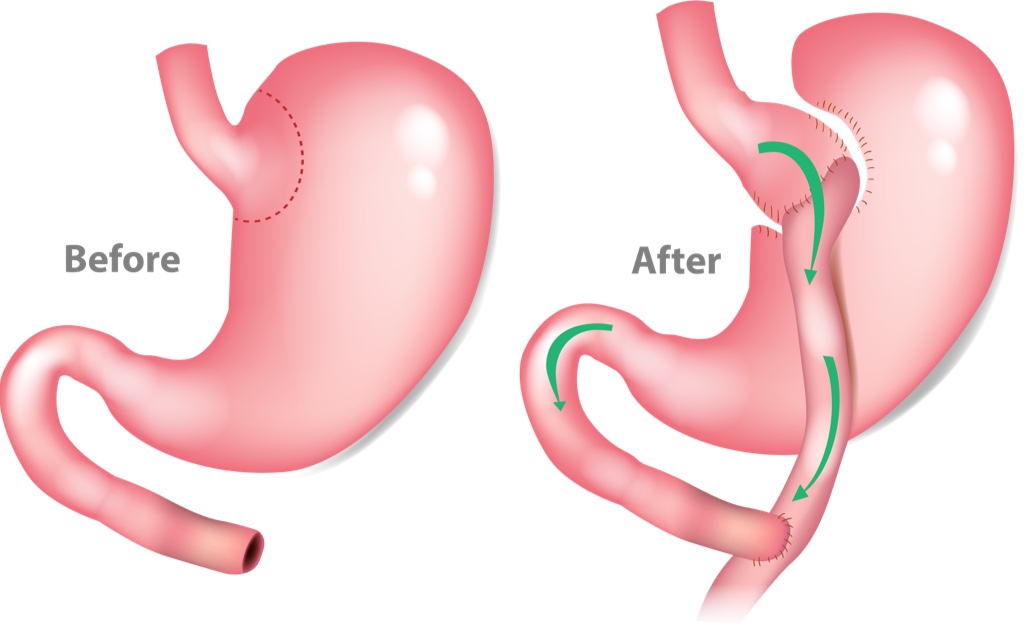What is Gastric Bypass Surgery?
Roux-en-Y Gastric Bypass (RYGB) is the most common weight-loss surgery in the US. It is both a restrictive and malabsorptive procedure that permanently decreases the size of your stomach and results in 60 to 75% weight loss. This laparoscopic procedure is completed through small incisions on the abdomen. It may require a multi-night hospitalization and a slightly longer recovery time than the gastric sleeve. This procedure is better suited for patients with severe acid reflux, type 2 diabetes or a higher BMI.

Benefits of Gastric Bypass Surgery
The Gastric Bypass is a common procedure for those interested in significant weight loss. Because it is both restrictive and malabsorptive, patients lose weight quickly. This procedure is best suited for patients with type 2 diabetes or severe acid reflux. Weight-loss procedures cause a considerable reduction in obesity-related health concerns such as hypertension, diabetes, sleep apnea, etc.
FAQs
Patients stay, on average, one night in the hospital.
After surgery, most patients return to work in one or two weeks.
No. A small number of patients can regain their weight but the vast majority lose significant weight and keep this weight off.
More than 95% of patients will successfully lose half of their extra body weight or more after surgery for weight loss. (1) Roux en Y gastric bypass patients, for example, on average lose approximately 70% of their extra body weight initially, and 2 years or more after surgery will regain approximately 5% of their extra body weight. (2) Compared to these results, patients who attempt weight loss without surgery, on average, are able to lose little weight and may gain weight in the long term.
You don’t have to make that decision alone. Our Bariatric team will look over your health history, lifestyle and health goals and will help you determine which procedure will benefit you. We design individualized plans so you can be sure you have the highest chance for weight-loss success.
No. Weight-loss surgery is very safe and decreases the chance of dying from obesity.
A recent study of 209, 116 patients found the risk of death from weight-loss surgery was 0.16%, or approximately 1 in 600. This rate is considerably less than most other surgeries, including gallbladder and hip replacement surgery. Large studies find that the risk of death from any cause is considerably less for patients after weight-loss surgery than for those who have severe obesity and have never had the surgery. Patients who have weight-loss surgery have a reduction in their risk of death by 40%. Death related to diabetes is reduced by more than 90% and from heart disease by more than 50% for patients after weight-loss surgery. The benefits of weight-loss surgery far outweigh the risks. As with any serious surgical operation, the decision to have weight-loss surgery should be discussed with your surgeon, family members and loved ones.
The Gastric Sleeve is performed at Coffee Regional Medical Center by your Bariatric team. The Gastric Bypass is performed at Emory Healthcare in Atlanta, Georgia.
Many people who suffer from obesity find it hard to lose weight and keep the weight off with diet and exercise alone. This is likely due to foods available and genes.
The National Institutes of Health (NIH) Expert Panel stated that, without surgery, long-term weight-loss is nearly impossible for those affected by severe obesity. Studies show little long-term success with diet and exercise alone. (3) Weight-loss surgeries are effective in maintaining long-term weight loss, in part, because these procedures change the body’s natural responses to dieting that make weight-loss so difficult. When a person goes on a diet, their body produces more hormones that cause an increase in hunger and a decrease in calories burned. This decrease in calories the body burns is more than explained by the decrease in body size. Therefore, there are significant differences between someone who has lost weight by diet and someone of the same size who has never lost weight.
For example, the body of the person who reduces their weight from 200 to 170 pounds burns fewer calories than the body of someone weighing 170 pounds who has never been on a diet. This means that in order to maintain weight-loss, the person who has been on a diet will have to eat fewer calories than someone who naturally weighs the same. Weight-loss procedures, unlike diet, also cause biological changes that help reduce food intake. Energy (in the form of food) intake is decreased with surgery by restricting stomach size and limiting absorption. In addition, weight-loss surgery changes the production of certain gut hormones (or signals) that communicate with the brain to reduce hunger, decrease appetite, and enhance the feeling of being full. In these ways, weight-loss surgery, unlike dieting, produces long-term weight-loss.
Take the First Step
The hardest part of most journeys is taking the first step. Your weight-loss journey won’t be without challenge, but it can be without regret. Find resources here to help you get started.
Am I a Candidate?
Weight-loss surgery is not for everyone. Health evaluations will help determine if you are a candidate.
Getting Started
Learn how to get started on your weight-loss journey and if surgical treatment is right for you.
Attend a Seminar
Deciding to have weight-loss surgery can be life changing. Attend a free, informational seminar to learn more.